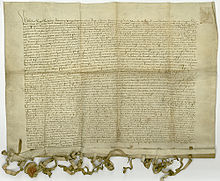Peace of Thorn (1411)

The Peace of Toruń of 1411 or the First Peace of Toruń or of Thorn was a peace treaty signed on 1 February 1411 in Toruń (German: Thorn) between Poland-Lithuania and the Teutonic Order ending the Polish-Lithuanian-Teutonic War (1409-1411) (see the Battle of Grunwald).
Border changes
In the north, the Teutonic Order resigned their claims to the Lithuanian province of Samogitia for the lifetime of the Polish King Władysław Jagiełło and the Lithuanian Grand Duke Vytautas (in practice forever).
In the south, the Dobrzyń Land (Polish: Ziemia Dobrzyńska / German: Dobriner Land) which had been granted in 1228 by Duke Konrad I of Masovia to the Order of Dobrin was ceded back to Poland.
Wkra Land (Polish: Ziemia Zawkrzańska, German: Land Sakrze) which had been mortgaged to the Order in 1384 by Siemowit IV, Duke of Masovia for 4000 et 600 sexagenas grossorum bohemicalium boni argenti [1] (4600*60= 276000 Prager Groschen of pure silver) had to be returned to Mazovia, the ally of Poland.
Ransom
After the Battle of Grunwald, the Polish King held approximately 14,000 Teutonic nobles and their mercenaries as captives. Initially the Polish monarch demanded a high ransom for each of the knights (prices ranging from 100 to 200 thousand times the amount of sixty Prager Groschen, that is between 19 and 38 kilograms in pure silver. In addition, the knights had to give a number of weapons to the Poles and promise they would never again raise their arms against the Polish Crown.
Finally the peace treaty settled the issue on the basis that the Polish King released all the captives in exchange for 100,000 times the amount of sixty Prager Groschen, that is almost 20 metric tonnes of pure silver.
Aftermath
In the case of failure to pay one of the rates (four yearly rates, 25,000 each), the indemnities were to rise by additional 720,000 Prague groshes. The first two rates were paid in full by the Teutonic state, mostly with money from foreign credits taken in exchange for liturgical vessels and all the silver belonging to the Teutonic state.
However, this proved to be a huge problem for the Teutonic treasury, as it was practically emptied by that time. In order to pay the remaining two rates, Heinrich von Plauen the Elder had to introduce high taxation. In addition, all of gold and silver in churches and castles of the state were confiscated and transported to Marienburg, for minting of new coins. In addition, von Plauen took even more credits from the kings of France and England, as well as from merchants of Paris, mayor of London, cities of Riga, Ghent, Hamburg, Bremen, Amsterdam, Antwerp and Leyden.
Although the peace conditions were initially very reasonable and the Poles and Lithuanians demanded only small portions of land, the peace settlement ruined the Teutonic treasury for the centuries to come and the state never recovered.
See also
External links
